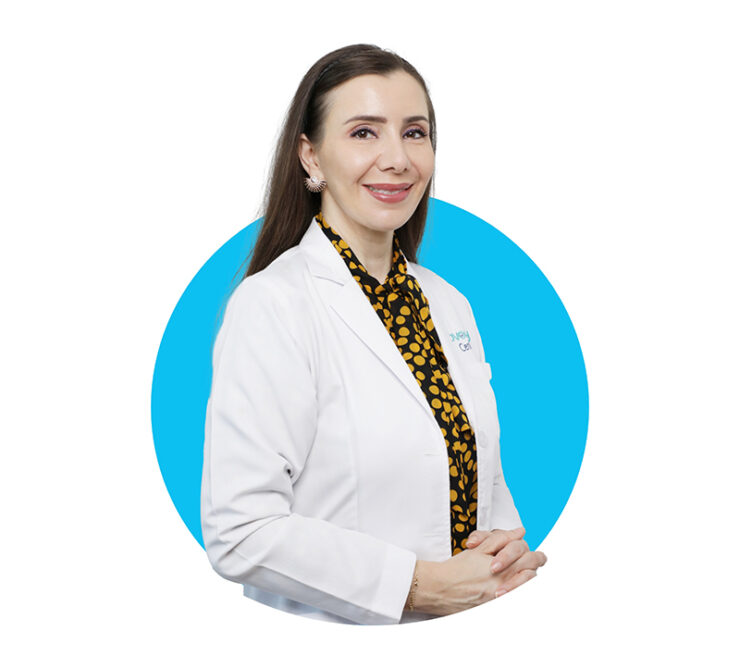Eczema/Atopic Dermatitis Treatment in Dubai, Abu Dhabi and Al Ain
Eczema is a term used to describe a set of conditions in which the skin becomes itchy or inflamed.
Eczema is a prevalent skin condition that is not transmittable. It can occur at any age and can be moderate or severe. This condition is most frequent in children, but it can also affect adults.
The actual cause of eczema is unknown, but research has shown that it arises because of a combination of genes and environmental triggers.
Although there is no cure, most people with this skin condition can control their symptoms by seeking medical help and avoiding irritants. Additionally, various treatments can help patients manage their symptoms.
What are the symptoms of eczema?
Eczema usually starts before the age of five and can last throughout adolescence and adulthood. It flares up for some people regularly and then goes away for a while. The symptoms of eczema differ from person to person, but the most common symptoms include having red, dry, scaly, swollen, and itchy skin.
Consult with a medical expert who can examine your skin and ask about your symptoms to determine if you have eczema.
What are the causes of eczema?
Eczema is caused by a mutation in a gene that compromises the capacity of the skin to protect itself, which leads to deficiencies in the skin’s barrier. Consequently, eczema enables environmental influences, irritants, and allergies to damage your skin.
Things that may increase your chances of having eczema include:
- Sweat
- Stress and anxiety
- An immune system reaction (irritants or allergens can cause your immune system to overreact)
- Environmental triggers (exposure to tobacco smoke or air pollutants)
- A family history of allergies or asthma.
What are the different types of eczema?
There are different types of eczema, including but not limited to:
- Atopic dermatitis
The most common type of eczema is atopic dermatitis. It usually starts during childhood and gradually becomes milder or disappears by age.
- Contact dermatitis
This type of eczema happens when your skin comes into contact with something that creates a rash.
- Dyshidrotic eczema
This type occurs when small blisters grow on your hands and feet. It affects women more than men.
- Nummular eczema
This type develops round spots after a skin injury, and it can be extremely itchy.
- Seborrheic dermatitis
Seborrheic dermatitis affects parts of your body with several oil glands, such as the scalp; it is a lifelong condition that can be managed with treatment. Some of the symptoms include scaly sores, inflamed skin, and persistent dandruff.
- Stasis dermatitis
This type happens when fluid flows out of weakened veins into your skin and causes swelling, redness, and itchiness. It affects people with impaired blood flow and is most common in the lower legs.
How is eczema diagnosed?
Our healthcare provider will be able to diagnose eczema by closely examining your skin and assessing your medical history. They will most likely ask you about the symptoms you are having.
They may also conduct a skin test for allergies, a skin biopsy to determine the type of eczema, or a blood test to rule out other possible skin conditions.
How is eczema treated?
Medical professionals will recommend a treatment plan based on your age, symptoms, and current health status.
There is no cure for eczema, but there are various moisturizers and medications that can treat and prevent eczema flare-ups, including:
- Creams and ointments that control itching and inflammation.
- Antibiotic cream to fight the infected area.
- Antihistamines (to prevent nighttime itching).
- Tar treatments (chemicals that relieve itching).
- Phototherapy (using UV light waves).
- Oral medications that control inflammation.
You can also try some self-care measures at home to help reduce eczema symptoms, such as eating healthy, using mild soaps, and adopting relaxation techniques.
It is critical to discover what is causing or aggravating your eczema so that you can alleviate itching and discomfort while also avoiding infection and further symptom flare-ups.
Schedule an appointment today to get your customized treatment plan
Even when an area of skin has healed, it is vital to continue to look after it because it can become irritated again.
If you are experiencing any of the eczema symptoms, do not hesitate to contact us today to schedule your initial consultation.
Speaking with a medical specialist will allow you to have your very own personalized treatment plan.
If you have food allergies, you should avoid eating certain foods because they may induce or aggravate your eczema. You may have a food allergy if your eczema flares up after eating a specific food.
Eczema can last a lifetime; it can begin when you are a child or a teenager and continue when you are an adult. In some cases, it can fade away when you become an adult. Each option depends on the individual.
Eczema is a chronic condition, which means it will not go away. However, treatments are quite successful in alleviating itchy and dry skin.
The best way to reduce eczema symptoms is to adhere to your doctor’s recommendations for maintaining healthy skin. There are many things you can do regularly to prevent eczema flare-ups. For example, you can drink a lot of water daily and reduce your exposure to allergens and irritants.
As soon as you discover any eczema symptoms, see your dermatologist or a healthcare specialist and get help immediately.



